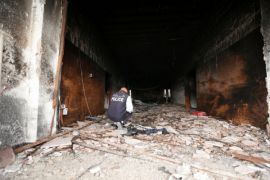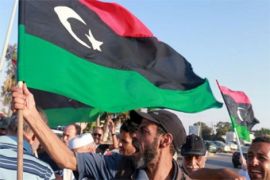A rebel spokesman, Abdel Basset Mezerik, told Al Jazeera television at least six people were killed and 47 wounded in the early morning in the insurgents` last major stronghold in the west of the country.
Libya`s third-largest city has been under siege by pro-Gaddafi troops for about seven weeks. Hundreds of people are believed to have been killed there.
"The bombardment is still going on," a rebel who declined to be named told Reuters by phone from the coastal city.
The insurgents said on Saturday that pro-government forces pounded the city with mortars and rockets, targeting a dairy plant, a day after a Western rights group accused Gaddafi loyalists of using cluster bombs. Libya denied it.
Libyan officials say they are fighting armed militia with ties to al Qaeda bent on destroying the country, denying government troops are shelling Misrata.
But evacuees who arrived in neighbouring Tunisia at the weekend, including at least one wounded rebel, said the city was being targeted day and night.
"Everyday people are dying," one teenager said, lying in a hospital bed in the Tunisian city of Sfax. He and dozens of other wounded were taken to Tunisia by boat operated by the medical charity Medecins Sans Frontieres (MSF).
He said he had decided to take up arms as fighting escalated last month because all his friends were, but that sniper fire wounded him in the stomach and thigh.
"I started fighting because everyone else was," the 17-year-old said, declining to be named.
MSF evacuated 99 people from the city on Friday, of which 64 were wounded -- mainly from gunshots or shrapnel.
One of the wounded brought by ambulance to Sfax from the port of Zarzis, where the boat docked, had the black-green-red rebel flag draped over his stretcher.
Ibrahim Ali, who accompanied his wounded neighbour on the MSF boat, said fighting in Misrata was getting worse by the day.
"People are terrified," he said.
Yussef, who arrived on another MSF boat two weeks ago with his wounded brother, said he had gone to greet the new arrivals.
"They all said the same thing -- they (government forces) can`t stop shooting, it is non-stop," he said in broken English.
Residents say they and thousands of stranded migrant workers face shortages of basic foodstuffs and medical supplies and have only sporadic water and electricity.
"It is terrible, a disaster. Some families try to go to safer areas, some live all together in cramped conditions to be safe," Yussef said, giving only his first name.
Ali echoed rebel calls for more urgent action from NATO.
"The people of Misrata are asking that they do more to save them," he said. (*)
Editor: Kunto Wibisono
Copyright © ANTARA 2011











